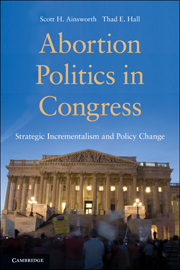Book contents
- Frontmatter
- Contents
- Tables
- Figures
- Acknowledgments
- Part I Strategic Incrementalism and the Political Backdrop for Abortion Politics in Congress
- 1 Some of the Politics Surrounding Abortion Policy
- 2 The Strategic Foundations for Incrementalism in Legislatures
- 3 The Nature of Congress and Incrementalism in Abortion Politics: Views from the Inside and Views from the Outside
- 4 A Short Legislative History of Abortion
- Part II Abortion in the House
- References
- Index
3 - The Nature of Congress and Incrementalism in Abortion Politics: Views from the Inside and Views from the Outside
Published online by Cambridge University Press: 05 June 2012
- Frontmatter
- Contents
- Tables
- Figures
- Acknowledgments
- Part I Strategic Incrementalism and the Political Backdrop for Abortion Politics in Congress
- 1 Some of the Politics Surrounding Abortion Policy
- 2 The Strategic Foundations for Incrementalism in Legislatures
- 3 The Nature of Congress and Incrementalism in Abortion Politics: Views from the Inside and Views from the Outside
- 4 A Short Legislative History of Abortion
- Part II Abortion in the House
- References
- Index
Summary
A polarized political class makes the citizenry appear polarized. (Fiorina, Abrams, and Pope 2005, 5)
Introduction
The discussion in the previous chapter regarding the legislative dynamics of incremental and nonincremental politics provides a theoretical basis for understanding the foundations of strategic incrementalism. Legislators experience diverse electoral and policy-making environments, but, for many legislators, abortion politics in both the electoral and legislative settings are particularly highly charged. In this chapter, we examine how the environments surrounding abortion politics, both in the U.S. House and in the public at large, have changed over our period of study. Specifically, we examine factors internal to the U.S. House of Representatives, such as the ideology of the chamber as a whole, the party composition of the chamber, and the ideology of specific committees in the chamber. Changes in ideology since the Roe decision may make the policy-making environment more conducive for either pro-choice or antiabortion advocates in either an incremental or nonincremental fashion.
Profound ideological shifts occurred during the period covered in our work, but ideological shifts do not necessarily alter key aspects of the policy-making environment. For instance, the historic shift in the House after the 1994 midterm elections overturned over four decades of Democratic control. However, even after the shift in partisan control at the beginning of the 104th Congress, the dynamics of supermajoritarian politics remained largely unchanged during this time while the dynamics associated with standard majoritarian politics – the politics that are most amenable to incremental strategies – changed dramatically. By standard measures, after the 1994 elections, conservative majorities were easier to muster, but mustering conservative supermajorities actually became harder, especially when contrasted to the 1980s.
- Type
- Chapter
- Information
- Abortion Politics in CongressStrategic Incrementalism and Policy Change, pp. 56 - 89Publisher: Cambridge University PressPrint publication year: 2010



